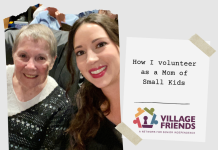I just read an article about how the Church can help those who struggle with depression. I appreciated Garrick D. Conner’s input into the conversation about mental health issues in the Church, as his words are compassionate, sympathetic, encouraging, and exhortative. He gave a few ways we can support those with mental illness as the Church, namely by “obeying the ‘one another’s'” in the Bible – that is, loving one another, praying for one another, and bearing each other’s burdens.

I have found that mental illness is my greatest daily battle, and being a mom with mental illness only complicates and deepens the conflict. I know a good number of people feel confused, intimidated, or frustrated when faced with a friend or family member who has depression or other mental health symptoms, and I think a lot of times that stems from not knowing what to do or how to help. Therefore, I want to encourage those around us – specifically moms combating depression, anxiety, psychosis, and other mental health symptoms – with a few words on how you can help and how much of a difference it can make. Here are some ideas of how you can invest in the life of a mom with mental illness to support and embolden her in her struggles.
- Listen. One of the best and most important things you can do is listen. When a mom shares how she’s having trouble keeping up with her four-year old because she’s so exhausted from fighting off depression and anxiety all day, listen. It’s tempting to want to add in commentary or a relatable story, and sometimes that’s appropriate, but sometimes it’s better to hear her out and respond with compassion rather than drawing on your own similar experiences. When a mom with mental illness who can hardly get out of bed in the morning because she’s anxious about the day ahead confides in you, don’t immediately tell her you understand. Listen. In some cases, in many I would argue, if you don’t have a mental health condition, you might not understand from firsthand experience. Drawing a connection between your tiredness because you only got 5 hours of sleep and her exhaustion from fighting off thoughts of self-harm and self-degradation every day might make her feel like you’re minimizing her pain. If your friend is struggling with the death of a loved one and you bring up the death of your pet fish, your friend would likely feel you’re being insensitive. In the same way, bringing up difficulties that relate but are not on the same scale as mental health symptoms downplays the significance of the struggle in your friend’s or family member’s life. When in doubt, listen.
- Ask questions. There are going to be things you don’t understand if you haven’t dealt with depression, anxiety, or other mental health conditions yourself. Sometimes the best thing you can do is ask about what you don’t understand. Open up a space for your mom friend or family member to share her burdens with you. Show you are interested in empathizing even if you haven’t experienced her struggle yourself. Moms with mental illness have a lot going on, more than just the lives of their children. More so than many people, moms with mental illness have a very complex and painful inner world they’re contending with every day while trying to wrangle their kids, work, take care of the house, and feed the family. The emotional toll is huge, but letting a mom open up about what her anxious or depressive thoughts have centered around that week can give her a way to process and maybe overcome the issues plaguing her.
- Offer to help. Everyone needs help and support, and moms with mental illness are no exception. Even with a supportive significant other, moms with mental illness can use some assistance. My husband is the most central and essential support I have, but without help from others, we would never have time to spend with just each other, which is essential to our marriage and to my mental health. I need to be able to talk with him, laugh with him, share with him, and cry with him, but with a child always around, it’s hard it find space and time to do that. I thank God for our supportive family. I thank God for supportive friends. A mom with mental illness often has small, tangible needs that make a huge difference to her. Offer to take care of the kids while she goes grocery shopping. Offer to cook her family a meal. Offer to take her to a doctor’s appointment when she’d afraid to go alone. These things take a little bit of effort, but they can help her immensely.
- Pray. Telling a mom with mental illness to “just pray more” or even just “I’m praying for you” and leaving it at that is not helpful. John writes in his first epistle, “let us love not in word or talk but in deed and in truth.” That being said, prayer is not a last resort either. Pairing prayer with deed is the most effective way to demonstrate your care and love for a mom with mental illness. I would argue the verse, “do not be anxious about anything but in every situation, by prayer and petition, with thanksgiving, present our requests to God,” is not speaking about clinical anxiety. The thing is, clinical anxiety is not anxious about anything, it’s just terrified and worried with no ready impetus. This verse applies more to those interceding for those with anxiety – do not be anxious for your family member or friend, but pray with gratitude that God aid them, encourage them, and heal them. Lead by example. If you expect your mom friend with mental illness to pray about her condition, make a habit of praying for her yourself.
- Speak words of encouragement. Some of the sweetest words that I’ve heard in my struggle with mental illness have been about how much someone respects and admires me for how I deal with it. Sometimes, I just need to hear that someone sees me struggling and finds my journey encouraging. One of the most significant goals in my life is to demonstrate the strength of Jesus in my fight against depression, anxiety, and psychosis. To hear that someone notices that and sees Christ in me is so gratifying. Many times, our children don’t understand how hard we’re trying to support them, how much we love them, and what sacrifices we’re making for them. It takes someone besides our kids to tell us they see what we’re fighting and how hard we’re working at it. It takes someone besides our kids to tell us we’re doing a good job, to help us see that even despite our mental illness, we’re loving our children with everything we have and that our work is commendable. If you don’t see how hard your mom friend is fighting, then go back to number 2 and ask questions. When you do see how much effort and love she’s putting into her struggle, make sure to let her know. Sometimes those are the best words we can hear, “You’re doing a great job!” or “I admire how you…” or “I know it’s hard, but look at how far you’ve come.” Encouragement is important for everyone, and that is definitely the case for moms with mental illness.
Let me add one thing. By presenting ways you can help a mom with mental illness, I don’t mean to suggest you are in any way responsible for your family member’s or friend’s mental health. Obtaining your essential identity from how you help your friend is codependency and will make for an even more difficult situation for you both. A mom with mental illness is ultimately responsible for her own journey, just like everyone else. That being said, your support can help a mom with mental illness make use of her own tools and coping skills in better and more productive ways. Let her take charge of her own recovery – you can’t run the race for her – but you can offer her what she needs along the way and cheer for her as she makes her way on this journey we call life. You can impact not only her but her kids and her family in this way, and seeing a woman come into her own, overcoming some of life’s most emotionally trying circumstances, might just change you, too.











